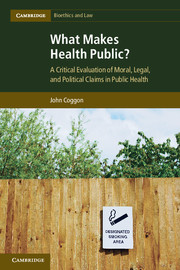 What Makes Health Public?
What Makes Health Public? Book contents
- Frontmatter
- Contents
- Foreword
- Acknowledgements
- What makes health public?
- Part I Basic concepts in public health
- Part II Evaluating evaluations: making health public
- Part III Tackling responsibility: liberal citizens as subjects and sovereigns
- 10 Liberal citizens: defining non-individuated individuals
- 11 Health made public: rights, responsibilities, and shared concerns
- 12 Conclusion
- Bibliography
- Index
- References
10 - Liberal citizens: defining non-individuated individuals
from Part III - Tackling responsibility: liberal citizens as subjects and sovereigns
Published online by Cambridge University Press: 05 June 2012
- Frontmatter
- Contents
- Foreword
- Acknowledgements
- What makes health public?
- Part I Basic concepts in public health
- Part II Evaluating evaluations: making health public
- Part III Tackling responsibility: liberal citizens as subjects and sovereigns
- 10 Liberal citizens: defining non-individuated individuals
- 11 Health made public: rights, responsibilities, and shared concerns
- 12 Conclusion
- Bibliography
- Index
- References
Summary
Introduction
In this chapter I describe and defend an approach to political liberalism. It will be clear following Part II that this, like any approach, will not appeal or be acceptable to everyone, given conflicting analytic and conceptual constraints that bind other analysts engaged in alternative theories. For reasons that I will explain, the population the approach speaks to includes all born, living human beings within the jurisdiction of a liberal State. Therefore, my account includes members that some theorists would exclude (e.g. due to a commitment to a ‘rationalised personhood account’) and denies a special normative protection to potential members that some theorists would include (e.g. due to a commitment to ‘preference utilitarianism’). I emphasise the word “special” because nothing in what follows precludes alternative bases and mechanisms for affording legal protections to non-humans or unborn humans. Simply, the account creates a system that affords ‘legal personhood’ – and thus legal rights, duties, etc. – to all born, living humans. Furthermore, I should stress that while the liberalism I describe speaks universally (albeit necessarily to a contestable classification of ‘everyone’), its normativity applies practically within a bounded jurisdiction; it could not be applied everywhere in the world as we find it, and should be conceived as relating to a geographically defined political State. It is important ‘to be upfront’ about each of these controversial points, because they go to the heart of some of the most contested ethical problems that we will face when presenting conclusions on policy problems. Moreover, I initially present the points succinctly and explicitly, as I want to be clear that I know that they may lead to accusations of parochialism or a localised status quo bias. Although the localism may be true, it is not a biased perspective, and I do not intend that the upshot of the analysis be understood as unduly conservative, morally blind, or morally imperialistic. Rather, I aim to explore a sustainable and defensible understanding of political normativity that is applicable in the context of contemporary State liberalism, and which can be engaged in a positive progression within such a system. I would emphasise that this analytic focus is of considerable importance in the current political climate, it does not preclude wider considerations of transnational obligations, and many of the issues discussed above and below have application outside of the approximate political structure that I take as the necessary backdrop to analysis. Equally, whilst I am driven by some ideal-type concerns, I consider it crucial to develop the analysis in a manner that makes it realistically applicable to contemporary societies, and consider mine a ‘non-ideal’ theory. (If a label is needed, it approximates what might be described as soft-perfectionism.) The following analysis draws from, and is influenced by, many of the theorists whose works we have considered in the preceding chapters. While I do not claim to have stumbled upon a new political theory, in the context of the debates I am addressing I do hope that the following work is elucidating, useful, and provocative. Where it does not convince all readers, I aim at least to bring to the fore the pressing issues that demand attention in theorising about public health law and ethics. I develop my position in this chapter through four stages of argument, which allow me to articulate the basis, shape, and scope of the political liberalism that I would have underpin policy.
- Type
- Chapter
- Information
- What Makes Health Public?A Critical Evaluation of Moral, Legal, and Political Claims in Public Health, pp. 207 - 234Publisher: Cambridge University PressPrint publication year: 2012
References
- 1
- Cited by
